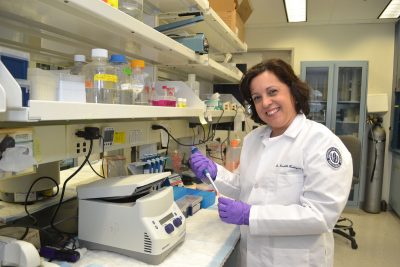
By: Jessica McBride
Dr. Annabelle Rodriguez-Oquendo, professor of cell biology and the Linda and David Roth Chair of Cardiovascular Research, has made important advances in her research since her arrival at UConn Health two years ago, in support of the University’s mission to further scientific understanding of human disease and develop precision medicine for better patient care.
Rodriguez-Oquendo, an endocrinology specialist, came to the University of Connecticut from Johns Hopkins in September of 2012 because of the commitment by both the State of Connecticut and UConn to the biosciences and genetic research, the opportunity to collaborate with world-class scientists at UConn and The Jackson Laboratory for Genomic Medicine, and UConn Health’s large and successful fertility clinic.
Since arriving at UConn Health, Rodriguez-Oquendo has received attention for important discoveries regarding a study she led, which was published in the May 20 issue of PLOS ONE. This study, in which Rodriguez-Oquendo and her team charted the genotypes of participants and tracked episodes of heart disease over a period of seven years, concluded that a common mutation in a gene (SCARB1) that regulates cholesterol levels may raise the risk of heart disease in carriers. Now that UConn researchers know the connection between the mutation in SCARB1 and heart disease, their work will focus on determining a way to fix it.
Rodriguez-Oquendo has also brought her experience and expertise in technology commercialization to UConn Health, with the move of her startup, Lipid Genomics, into the UConn Technology Incubation Program (TIP) in June 2015. Lipid Genomics is developing its FDA-approved investigational drug targeted at people with variations in the HDL (“good cholesterol”) SCARB1 gene. More than 117 million people in the US could benefit from this drug. The market value for this therapeutic is $2.8 billion and for the company’s second product, a novel immune checkpoint inhibitor known as lymphocyte activation gene-3 (LAG-3), the market value is $1.4 billion, totaling a potential $4.2 billion addressable market for Lipid Genomics.
Most recently, Rodriguez-Oquendo has edited an important, comprehensive textbook on precision medicine: Translational Cardiometabolic Genomic Medicine. Currently available for pre-order with anticipated release in October 2015, this work is an important resource to postgraduate (medical, dental, and graduate) students, postdoctoral fellows, basic scientists, and physician scientists seeking to understand and expand their knowledge base in the field of genomic medicine as it is applied to cardiometabolic diseases. It encompasses a range of topics that highlight bioinformatic approaches to better understanding functionality of the noncoding regions of the human genome to the use of molecular diagnostic testing in predicting increased risk of cardiovascular diseases. Where applicable, the text also includes chapters related to therapeutic options specifically aligned to molecular targets.
UConn’s Office of the Vice President for Research commends Rodriguez-Oquendo on these recent accomplishments, all of which work to further advance Connecticut and UConn’s commitment to the biosciences, genetic research, and precision medicine.
Read more about Rodriguez-Oquendo’s research in UConn Today. Information about Rodriguez-Oquendo’s textbook is available at the Elsevier Store.